The Light from the TV Shows: A Chat with John Altschuler (“The Goode Family,” “King of the Hill”)
Hey, kids, remember “The Goode Family”? You don’t…? Boy, that’s funny. You’d think you’d remember an animated series created under the watchful eye of Mike Judge, the man behind “Beavis & Butthead” and “King of the Hill,” not to mention such cult-classic films as “Office Space,” “Idiocracy,” and “Extract.”
Oh, wait, I know why you don’t remember it: because it only ran for 13 episodes in the summer of 2009 before ABC axed it.
Thankfully, however, the fine folks at Shout Factory have come through for “Goode Family” fans in the same way they’ve come through for fans of so many other too-quickly-canceled series over the years, offering up a complete-series set which features all of the episodes, including audio commentary from executive producers John Altschuler and Dave Krinsky on several of them, as well as deleted scenes and premises for unproduced episodes. Even better, the aforementioned Mr. Altschuler was kind enough to spend a few minutes on the phone with Bullz-Eye to discuss the series, not to mention some of the other projects he’s worked on over the course of his career.
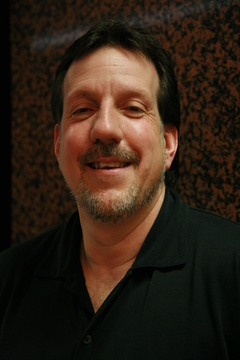
John Altschuler: So, Will, what can I do you for?
Bullz-Eye: Well, sir, I do this TV column for Bullz-Eye, I’ve more or less got carte blanche to cover what I want, and, dammit, I want to cover the DVD release of The Goode Family: The Complete Series.
JA: [Laughs.] Well, great…I hope!
BE: It is absolutely great. I was a fan for the all-too-few episodes that aired, so it’s been nice not only to revisit the series as a whole but also to listen to the commentaries that you and Dave recorded for the set.
JA: Excellent, excellent. Well, I can’t stand the sound of my own voice, personally, but I hope it wasn’t too bad for you.
BE: No, no, not painful at all.
JA: Well, good!
BE: So to begin at the beginning, as it were, you and Dave actually knew each other well before you first met up with Mike Judge on “King of the Hill.”
JA: That’s right. Dave Krinsky and I go back to…we went to the University of North Carolina together and moved out to L.A…wow, back in ’87! And we just did movies and TV for, y’know, forever, and got hired on “King of the Hill” in its first season, and that’s how we met Mike Judge.
BE: When you guys went out there, did you have a vision for what you wanted to write? Did you have a specific hankering to work in animation?
JA: We never considered it in our lives. We actually wanted to do features, and…back then it was such a different world. An agency would not represent you if you wanted to do TV and movies. And we wanted to do both, but since nobody would rep that, we were doing features. And then just on a fluke, this woman named Carolyn Strauss at HBO…she was great. Well, obviously, I liked her because she read our movie script, and she said, “Would you guys consider working on a TV show?” And we said, “Yeah!” And she showed us this show called “The High Life.” It was black and white, set in the ‘60s, but it was this guy Adam Resnick who was doing it, so we said, “We’ll do that!” She said, “Will you move to New York?” “Yeah!” “In three days?” Sure!” [Laughs.]
So that’s how we got into TV. And that show didn’t do well, but people liked it. Y’know, it was a good show, and people respected it, so it allowed us to have really our choice of working on television shows…and we liked it. I mean, the thing about TV is that you have a little bit more control over the medium, and you do a lot of them, so you can learn more, whereas you make so few movies that you can’t really learn anything, so you can’t really get better. Now, oddly enough, because the world’s changed, Dave and I are able to do animated TV, live-action TV, live-action movies…everything. Which is pretty great for us.
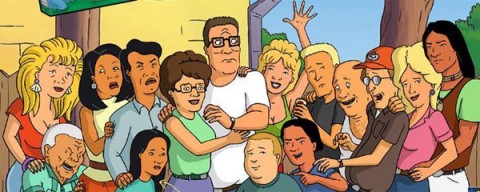
BE: When you got to “King of the Hill,” was there any sort of learning curve for working in animation?
JA: Yes, but…what’s interesting is that the writing wasn’t that different, because it was a very real show. You know, a lot of reviewers even said that it was the most realistic show on TV. And being from North Carolina, it just sort of fit in our wheelhouse. So the writing itself wasn’t so different, but when we started producing…animation is an incredibly intricate, long process that really takes about 10 years to get a handle on. There’s just all of these different stages and processes, with designs going here and then going to Korea and then coming back…it’s just this never-ending loop. But the writing was actually not that different.
BE: I must tell you that, were it not for “King of the Hill,” no one would know that I once spent three months working for A&B Propane in Chesapeake, Virginia. But the show has provided me with a certain pride in being able to say, “You know, I once sold propane and propane accessories…”
JA: [Laughs.] Yay! Our work is done!
BE: When “King of the Hill” was finally shuffled off into oblivion by Fox, who apparently finally realized that it was still on schedule…
JA: Yes, and they were upset that we were still making money. [Laughs.] I’m never going to understand the workings of that. We were a great show, and they just kept trying to cancel us. But we just kept hanging on until they finally succeeded in canceling us. It was, like, “What’s the deal? Is the problem that we’re too good and we make you too much money?”
I don’t think they ever understood why it was funny. It’s, like, with “Family Guy,” even though they canceled that, too, at least they go, “Oh, we know why it’s funny!” Even though they don’t. They think, “It’s ‘cause it’s crude!” But “King of the Hill” makes no sense to them. It’s not replicable in their minds. It’s, like, “Well, that show’s not funny. It’s boring!” That’s all I can figure out, anyway.
BE: Well, I loved it, anyway. In fact, I’m in the Television Critics Association, so I was in attendance for that table read that you did for the 200th episode.
JA: Oh, so you’ve heard me blather on before! [Laughs.] Well, good.
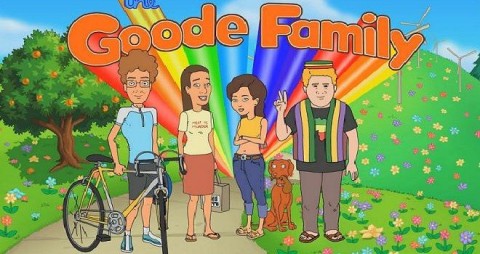
BE: So what was the timeline as far as the end of “King of the Hill” and the beginning of “The Goode Family”?
JA: Well, Dave and I had done the screenplay for “Blades of Glory” while we were doing “King of the Hill,” so what happened was… [Hesitates.] I’m trying to remember the exact timing, but…oh, of course we were still doing “King of the Hill” when we did “The Goode Family,” because Fox was very angry at us. [Laughs.]
BE: My apologies. I had convinced myself that “The Goode Family” was actually after “King of the Hill.”
JA: Hey, trust me, with this brain of mine combined with my general lack of sleep last night, I’m familiar with confusion. But, no, we did the season of “The Goode Family” concurrent with doing “King of the Hill.”
BE: You must’ve been pretty exhausted, then.
JA: You know, it wasn’t bad, because the timing of it…we only did the pilot and the 12 episodes of “The Goode Family,” and…Dave and I were really efficient. [Laughs.] And we were so ahead with “King of the Hill.” We had just great personnel – this woman Garland Testa was helping – so “King of the Hill” was going really fairly well, so we could concentrate. So we had a lot going on, but…it’s strange. I don’t know if you know this feeling where…well, like you just said, you cover what you want to cover for your column, so you cover a lot of things, I bet, which means you’re not bored and you’re not angry, because you’re sort of in control of what you’re doing. But when you’re on someone else’s clock and someone else’s dime, that’s devastating. When it’s your show, though, it’s kind of energizing. If that makes sense.
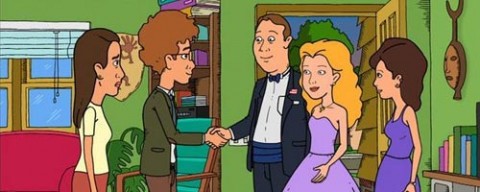
BE: It does, thanks to you putting it into my frame of reference. [Laughs.] Okay, so it’s fair to say that “The Goode Family” wasn’t exactly on for a lengthy period of time, but was there ever anything that had to be changed because ABC said, “Sorry, you can’t do that”?
JA: You know, it’s interesting, because ABC were actually really good partners creatively. With all the problems of when we were aired and how we were aired and picking shows to pair us with that we were not a great fit, they were very good with us creatively. The only thing we would run into were things like…we had the character of Charlie, who the gruff, Archie Bunker-ish character, except milder, say something like, “Let’s go down to the Asian place, those guys really know their way around a pig.” And it’d be, like, “How is this a Standards note?” And they’d go, “Well, you’re implying that all Asians like pork.” And I’m, like, “They do!” [Laughs.] “What do you want me to say? You go find me an Asian that doesn’t like pork that isn’t Buddhist…and even the Buddhists like pork!” So that was sort of frustrating.
And then one time we did an episode where the neo-Nazis adopt a highway, and at one point…what happened was that the main Standards guy was out of town, and we got these Standards notes that were just unbelievable. They wanted to shut us down! They even cited the word “sturm und drang,” which is just an uproar, because they thought it was some sort of slur! At one point, I was, like, “Okay, are you afraid we’re going to offend the neo-Nazis? Because I can’t figure out what the hell is going on!” And to be fair, when the normal guy got back…see, the stuff that Dave and Mike I do, we have absolutely no interest in offending people. We just don’t. But we like dealing with interesting stuff that nobody else deals with. So when you’re first working with us, it’s, like, “Oh, my God, you can’t do that, you can’t do that,” but then when you see how we handle it…
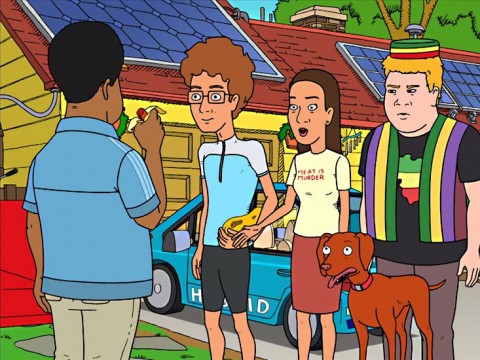
Like, when you pitch, “We’re going to do a show about class warfare in the lesbian community,” they’re horrified. But then they see it, and…the lesbians loved our show! [Laughs.] Basically, they see that we don’t do hatchet jobs. In fact, some people said that one reason maybe why the show didn’t catch on was that we didn’t do a hatchet job, that we sort of made the Goode family likeable when maybe we would’ve been better off just going the other direction. But that’s just not what we do. Look at “King of the Hill.” We’re just not into ridicule.
BE: And like “King of the Hill,” “The Goode Family” may have been a little exaggerated at times, but for the most part you tried to paint character as realistically as possible.
JA: Yeah, exactly. And, oh, my God, you come out here to California, my friend, and I’ll show you that things might seem a little bit ridiculous on that show, but we actually had to tone down reality to put it on that show. [Laughs.]
BE: To look at the IMDb page for “The Goode Family,” you kind of see that the show’s biggest problem was that people had such diverse opinions about it. The first user review calls it “the best show ever,” while the “Did You Know?” section leads off by noting that the show was canceled after a single season because of poor ratings and poor critical reception.
JA: Yeah, but, y’know, we actually got great reviews. For the most part, anyway. I mean stunningly good reviews. The bad reviews that we got…it’s pretty interesting and actually makes sense, but we got scathing reviews from The New York Times, NPR, and The San Francisco Chronicle. And it’s like a fucking joke, because they’re literally, like, “Oh, my God, how can you make fun of global warming?” But to be honest, we were pretty freaking happy, because we got a lot of great reviews. The sad thing, though, was that the reviews tended to say, “Watch it while you can.” [Laughs.] I remember one case…it was a good review, but the guy said, “The show’s fantastic, but it will not make it past the first season. If it was on Fox, it’d last for eight seasons, but on ABC, it’s gonna be gone.”
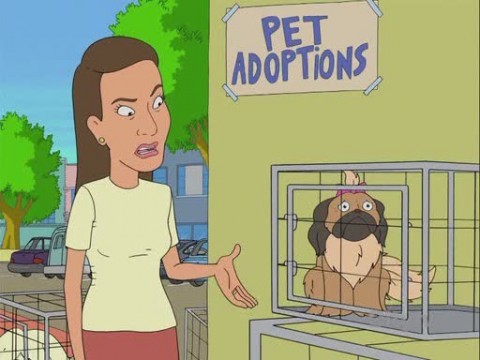
So there were a lot of reviews like that, and…it’s interesting, and we’ll never know if it was the wrong place, the wrong time, if the show wasn’t hard-hitting enough. We loved it, though, and when people watch it, when people actually see it, they seem to really respond to it. “That was great!” And all we can do is say, “Well, we thought so.” So who knows why it didn’t take off?
BE: Before the show premiered, did you consider the fact that, because it was being so politically correct to an absurd degree, it might take time to find an audience?
JA: You know, what’s interesting is…I thought it would connect, even though we knew it was weird going on ABC. We were really worried when we were put with “Wipe Out.” It was, like, “Oh, boy, this doesn’t seem like our audience.” This one comedian said, “You know the people you made your show about…? People really hate those people. They really don’t want to hang out with them.” And we were, like, “Okay…” [Laughs.] It was interesting, though, that the lefty blogosphere types really liked the show. Lesbians, even wacko environmentalists, they sort of understood that, yes, we were making fun of them, but it wasn’t ugly making-fun. But the ABC audience for a family game show was decidedly different.
BE: How long ago did you start working on the DVD set? Was it right after the show went off the air, or did it only come about because Shout Factory asked about doing one?
JA: Well, this was very frustrating, actually. The DVD set happened because of the tenacity of this guy named Glenn Lucas, but what was frustrating was that…I don’t know, I guess we kind of fell between eras, sort of. It wasn’t actually before Hulu, but it was before Hulu had a lot of deals set up. You couldn’t get “The Goode Family” anywhere. You couldn’t stream it, you couldn’t buy downloads…it just wasn’t available! But basically Shout Factory just loved the show, and this guy Glenn Lucas made the deal for us. It was a tough deal, because a lot of times with Hollywood, if there’s not a lot of money involved, companies will just say, “Eh, let it go.” And not “let it go, go ahead and do it,” but, “nah, we’d rather not.” So it took a few years, but we did it, and…it just makes me happy. Because, y’know, we’ve just put so much work into the underground-comic look of the show that I just think is so beautiful. And, I mean, where else do you get to see a vegan dog running around eating all of the other pets in the neighborhood? [Laughs.] Well, I think it’s fun, anyway…
BE: Shout Factory invariably does a great job with their reissues.
JA: Oh, they’re a top-flight company. They’re just good at what they do, and they’re solid citizens. We’re going to keep working with them.
BE: If only you could get them to put out the rest of the “King of the Hill” seasons…
JA: Oh, God, they want to.
BE: Do they, really?
JA: They do! They’ve been trying, but…I guess it’s just not going to happen.
BE: That sucks.
JA: Yeah. And it’s really frustrating because, like Mike Judge points out, Fox stopped putting them out just as the show had a resurgence and started getting really good again. [Laughs.] And he wants those out on DVD, but they’re not.
BE: Well, at least they’re available for online screening. That’s something.
JA: Something, yes. But it’s still frustrating.
BE: Before we wrap up, I wanted to ask about a few other things very quickly, the first being the script for “Blades of Glory.” Given that you and Dave came out with the intent of working on features, that must’ve been great to get that big-screen break at last.
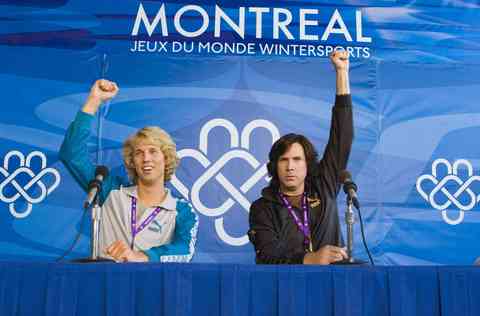
JA: Oh, it was great. And it was interesting, because Dave and I were brought on, and we did the script, and it got put right into production. It was, like, “Wow, when does that happen?” [Laughs.] It was a very fun project, because the initial idea was not ours. The script was, but the initial idea wasn’t. We just stepped in, and we were, like, “Okay, let’s take this and treat it incredibly seriously, where everything with these skaters is life or death, and take it completely over the top.” It’s been incredibly satisfying, because people just love that movie. I mean, I can’t even tell you the range of people. There’s this judge who’s very high up in the ranks, and his favorite movie is “Blades of Glory,” and I met a woman at a party who said, “You know, we bought that movie for my dad because it’s the only thing that makes him laugh!” So it’s beyond gratifying. And it opened up a lot of doors for us. So we’re very proud of it.
BE: So what’s the status of “Silicon Valley,” the live-action pilot you guys are doing with Mike for HBO?
JA: We’re working on that as we speak. Literally. We’re starting to cast that, and Mike Judge is going to direct it, which I think is great. We love it. We think it’s a show that needs to be made, because…my brother is an electrical engineer, my brother-in-law is an electrical engineer, Mike Judge was an engineer, and the one thing we’ve noticed is that nobody gets these guys right. I mean, “The Big Bang Theory” is fine, but that’s not who these people are, and it’s such an interesting, vibrant world where everything’s happening. So it was, like, “Oh, let’s go make fun of that!” [Laughs.]
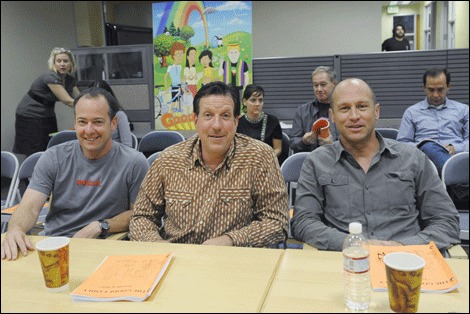
BE: Finally, I feel as though it’s my responsibility to get status updates on everything currently attributed to you on IMDb.
JA: [Laughs.] Well, “The Jetsons” is…that’s funny, we were just talking about that recently. Who knows what’s going to happen with that? But “The Giants of Groil” definitely isn’t going to happen. And “Woody Woodpecker,” man, that’s gonna be a long, long, long process. Like, we just started, and animated movies…by the time you say, “Oh, we’re rolling,” it’s four years later. But we’re doing this project, “Brigadier Gerard,” that has Steve Carell attached to star and Jay Roach to direct. It’s hard making movies these days, though. It’s tough. Good thing you’re in TV, my friend!
Related Posts
Comments Off on The Light from the TV Shows: A Chat with John Altschuler (“The Goode Family,” “King of the Hill”)
Posted in: Entertainment, Interviews, News, Television
Tags: ABC, Beavis and Butthead, Blades of Glory, Brigadier Gerard, Carolyn Strauss, Dave Krinsky, Extract, Fox, Glenn Lucas, HBO, Idiocracy, John Altschuler, King of the Hill, Mike Judge, Office Space, Shout Factory, Silicon Valley, Steve Carell, The Giants of Groil, The Goode Family, The High Life, The Jetsons, The Light from the TV Shows, Will Harris, Woody Woodpecker








